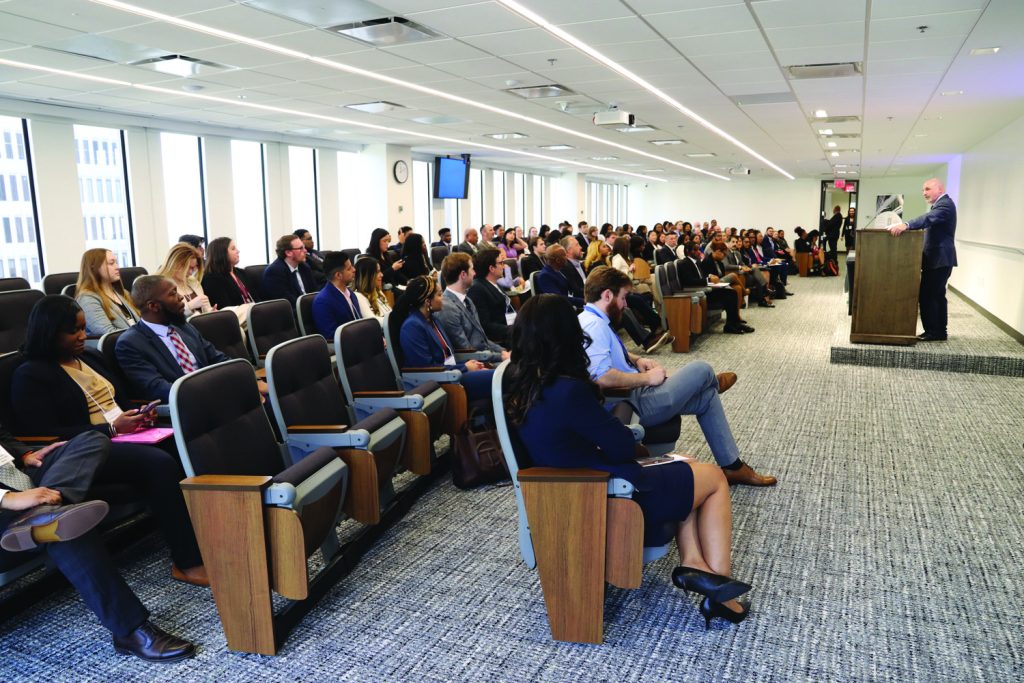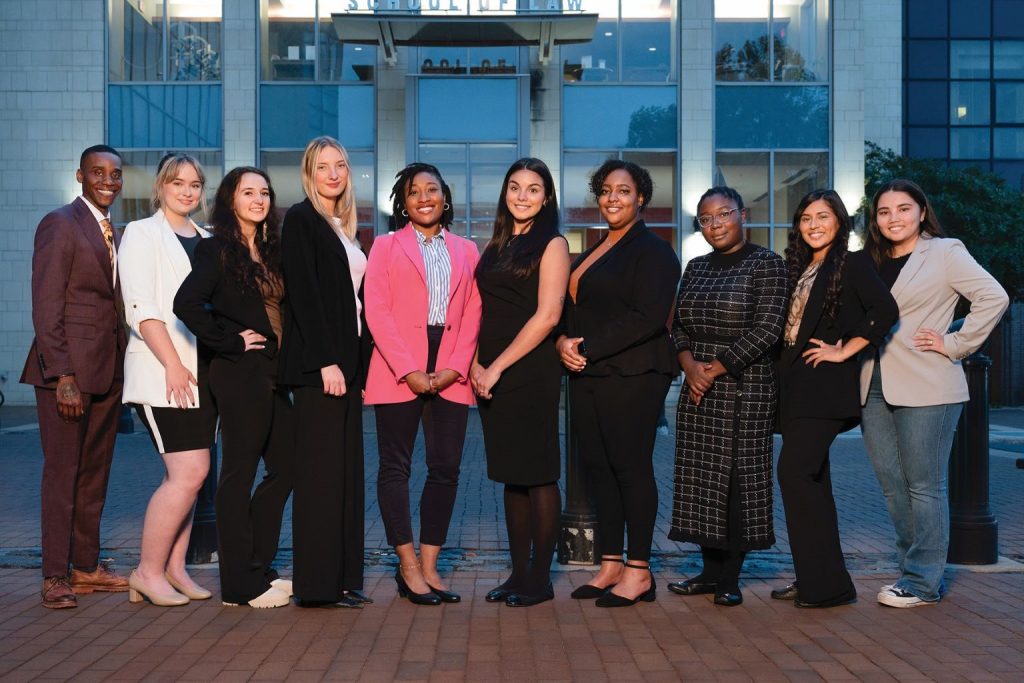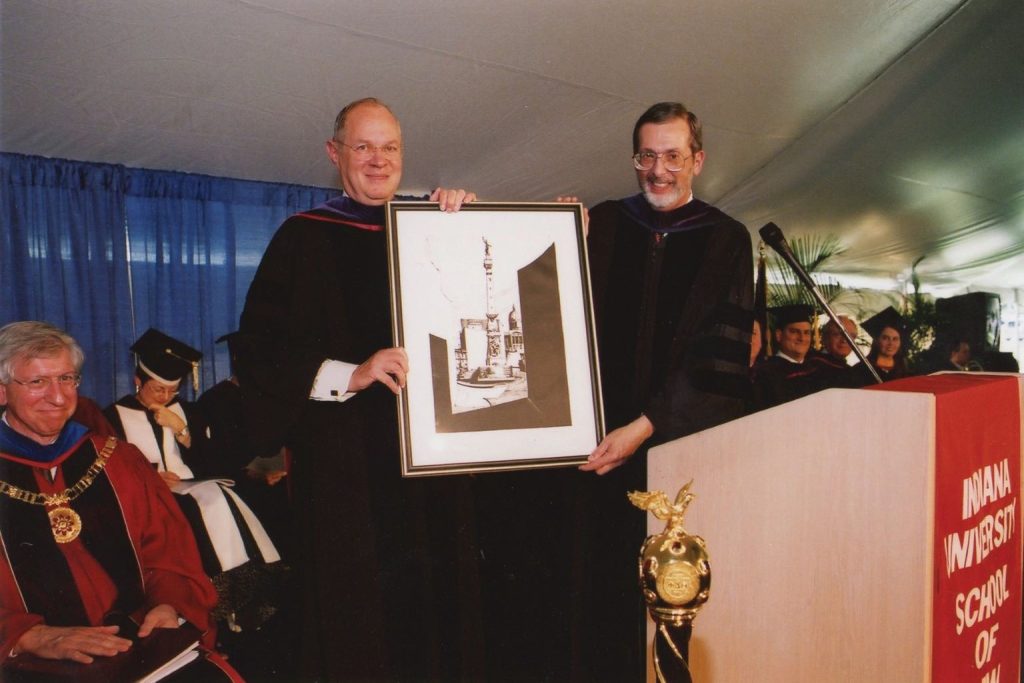Law school is expensive. But depending on your individual circumstances — first generation, veteran, military, academic scholar, financially disadvantaged or having an interest in a certain practice area — scholarships exist that may be able to help you with tuition and other costs.
Shannon Reid knows this well. She completed her undergrad at Indiana University Bloomington with an interest in international law. She decided to take a gap year after college to work in her hometown as a substitute teacher.
After a year of teaching, she was ready to be a student again.
“I began researching law schools I wanted to attend while I was in college,” Reid said. “I recommend starting the prelaw journey at least 18 months before the anticipated start of law school.”
Reid said she did well in college and finished with a good GPA. She took the LSAT in October 2023 and again in January 2024. She researched law schools and applied to the ones she thought would be a good fit for her. One of the law schools she applied to was Indiana University Robert H. McKinney School of Law.
“I learned earlier this year that I was a contender for the Kennedy Law Scholar Award at IU McKinney Law based on my academic excellence, and I was invited to interview with the school,” Reid said. “I learned in March I was one of two recipients of the award, and it secured my commitment to attend the school.”
The Kennedy Law Scholar Award includes full tuition and an annual stipend for living expenses. The award is renewable for all three years of law school if the requirements are maintained.
Reid said she wanted to get the best legal education she could afford and receiving the scholarship was the reward for her hard work in achieving a good undergrad GPA and LSAT score.
How do you set yourself up to be in the best position to get a scholarship? What type of scholarships are available? Where do you find additional scholarships? Keep reading.
Merit-based and need-based scholarships
Hillary Mantis, assistant dean for the prelaw program at Fordham University, said most schools offer merit-based scholarship based on undergrad GPAs and LSAT scores.
“When a law school accepts you, most will already have considered you for a scholarship without an additional application for financial assistance based on the strength of your admissions application,” Mantis said.
Barbara DiGiacomo, associate dean at The University of Akron School of Law in Ohio, said all students admitted to its J.D. program are automatically considered for scholarships. There is no separate application. Students are notified of their scholarship award when they are accepted.
“Almost 95% of our 2024 entering class was awarded a scholarship, ranging from $500 per year up to full tuition and fees,” DiGiacomo said. “All Akron Law scholarships are guaranteed, meaning that as long as a student remains in good academic standing, their scholarship will be automatically renewed.”
DiGiacomo said that when weighing law school options, students should carefully consider the possible risk of a “conditional” scholarship, one which requires a student to maintain a certain GPA or a certain class standing.
“Law school is hard enough without having to worry about finances,” she said. “Guaranteed scholarships give students the ability to plan their finances in advance, thereby decreasing their stress and allowing them to focus on their studies.”
Hilary Waldo, director of marketing and communications at Atlanta’s John Marshall Law School, said the school awards merit scholarships to those who qualify at the time of an admissions decision, and 93% of the 2024 entering class received scholarships.

Boston University School of Law offers merit-based and need-based scholarships for J.D. students.
“Students who have received a merit scholarship that is lower than full tuition can be considered for a need-based scholarship in addition to their merit scholarship,” said Joanne Thomas, assistant dean for graduate admissions at BU Law.
At The Catholic University of America Columbus School of Law in Washington, D.C., scholarship offers are based on LSAT scores and undergraduate grade point averages said Megan Glinski, director of financial aid.
“Our scholarship program saw 99% of all incoming students receive a scholarship for the 2023-24 academic year,” she said.
Cornell Law School offers a blend of merit and need-based scholarships to make legal education more accessible for students from diverse financial backgrounds, said Justin Gravius, director of communications.
“With a median scholarship of $30,000 per year and scholarships awarded to more than 85% of the student body, Cornell Law is committed to providing financial assistance and reducing the burden of student loans,” Gravius said. “By alleviating some of the financial pressures of law school, scholarships allow recipients to focus on their studies.”
Drake University Law School’s Opperman and Fleck Scholarships give students with exceptional academic merit full tuition plus $10,000 per year to cover living expenses, said Kara Blanchard, assistant dean of admission and financial aid at the Iowa law school.
“The school also awards full tuition scholarships for select students who demonstrate a commitment to public service,” Blanchard said.
At Rutgers Law School in New jersey, merit is not defined solely by grades and test scores. A range of factors are considered, including leadership, work experience, writing and service, said Shanida Carter, director of marketing and communications.
David Kirschner, associate dean for admissions and financial aid at University of Southern California, Gould School of Law, said nearly 100% of its 1L students have received some merit-based support in recent years. Awards typically range from $20,000 to full tuition and are guaranteed for three years of law school if good academic standing is maintained.
At Touro University Jacob D. Fuchsberg Law Center in New York, 95% of students receive scholarships.
“Scholarship support is important to our students and a priority of our fundraising efforts,” said Dean Elena Langan. “It has become increasingly more important to be able to provide financial support for students who are dedicated to their legal studies, as well as those who show academic promise as incoming students.”
University of Massachusetts School of Law Dartmouth scholarships are not dependent upon students maintaining any specific grade point average or class standing.
“Our philosophy is that students should have the freedom to pursue justice in their chosen field,” said Melissa Costa, director of admissions. “We guarantee you will retain your scholarship for as long as you’re enrolled.”

University of Denver Sturm College of Law offers numerous options for first-year students, including full-tuition merit scholarships.
“Thanks to a significant investment, the Sturm College of Law can fund 20 full-tuition merit scholarships, with a first-year stipend, to incoming J.D. students with outstanding academic credentials,” said Christopher Wangelin, director of marketing and communications. “Eligibility focuses on incoming students with a preference to first-generation college students, those with financial needs, an LSAT score of 160 or above and an undergraduate GPA of 3.60 or above.”
University of Connecticut School of Law automatically considers all students for scholarship aid.
“Overall, 95% of the Fall 2024 incoming J.D. class received one or more scholarship awards,” said Lauren Terbush, director of J.D. admissions.
Terbush said merit-based scholarships for incoming students are renewable, unconditional and traditionally awarded based on the strength of a candidate’s LSAT score and GPA. Awards range from $5,000 to full tuition.
UConn School of law also has foundation scholarships, which are donor-funded and total more than $300,000 a year.
“Some foundation scholarships are tied to specific awarding criteria, such as demonstrated interest in particular fields of law (environmental law, public service, international law or business law) or candidate profile features such as military service or first-generation college graduate status,” Terbush said.
University of Georgia School of Law offers a wide range of financial assistance, from full-tuition-plus scholarships to book stipends.
“Many of UGA Law’s scholarship awards rest on the assessment of each applicant’s academic achievement and potential, while others honor experiences or values, such as first-generation college graduates, military service, proven leadership or a demonstrated connection with or intent to return to communities where there is not adequate legal representation,” said Heidi Murphy, senior director of marketing and communications. “The school guarantees that 100% of first-generation college graduates and veterans will receive a minimum of a one-quarter scholarship up to a full-tuition-plus award.”
At UGA School of Law, there are no separate forms to complete for scholarship consideration. Applicants are encouraged to provide a comprehensive view of their experiences and interests through their personal statements and résumés, Murphy said.
First-generation scholarships
Benjamin N. Cardozo School of Law at Yeshiva University in New York recognizes potential in students who are first-generation college or graduate students with its scholarships, said Jessica Walpert, director of admissions.
Seattle University School of Law also annually awards a scholarship to one entering student who is a member of a state or federally recognized tribe or of Native American descent and has demonstrated a commitment to Native American or Native Alaskan issues.
Southwestern Law School in Los Angeles offers first-generation scholarships that can be combined with renewable first-year scholarships to provide additional financial support for on-campus housing or books, said Steven Lopez, chief communication and marketing officer.
Active-duty military and veteran scholarships
University of California, Berkeley, School of Law offers $10,000-per-year scholarships to active-duty military personnel and veterans, said Tove Sharp, director of media relations.
Catholic Law participates in the Yellow Ribbon Program, which supports veterans who qualify for education benefits under the Post 9/11 GI Bill. The school and the Department of Veterans Affairs cover any remaining tuition and fees not covered by the bill.
Special interest scholarships
Waldo said Atlanta John Marshall’s alumni and community members fund a growing list of scholarships that students may apply for in addition to merit scholarships. Scholarships are available to students with a variety of special interests, such as public defense, patent law, public service and the desire to become a trial attorney.
At Cooley Law School, with campuses in Michigan and Florida, scholarship opportunities extend beyond those offered by admissions.
“Students may apply for additional scholarships after classes begin,” said Danielle Hall, assistant dean for admissions and financial aid. “The school also works with multiple organizations to offer third-party scholarships to students year-round.”

Deborah LaGioia, assistant dean at DePaul University College of Law in Chicago, said the school offers a range of scholarships to support students with diverse background and career goals.
“The Dean’s Scholarship is a renewable award for incoming students that requires no GPA for renewal,” LaGioia said. “DePaul also provides several specialized scholarships, such as the Keith and Paige More Breasties Scholarship that supports those impacted by breast or ovarian cancer, and the Bedoya Family Scholarship and Larry R. Rogers Sr. Endowed Scholarship with a focus on financial need, academic achievement and promoting diversity in the legal profession.”
DePaul’s centers and institutes offer paid fellowships in public service, health law and family law. External scholarship opportunities come from law firms, nonprofits and other organizations.
“Together, these scholarship opportunities provide DePaul law students with financial support, professional development and valuable experience in their chosen fields,” LaGioia said.
Florida State University College of Law also offers a variety of scholarships for students concentrating on particular legal practice areas, ranging from environmental law to public interest advocacy.
“FSU Law’s commitment to social justice is evident in its civil rights and public interest law scholarships, which are designed for students who are dedicated to advancing civil rights and advocating for underserved communities,” said Glenda Thornton, assistant dean for strategic initiatives.
At Georgia State University College of Law, specialty scholarships are offered in the areas of health law, intellectual property, public interest, elder law/estate planning, tax, immigration and trial advocacy, said Jaya Franklin, director of communications.

IU McKinney Law helps support students through an array of scholarships designed to recognize academic excellence, financial need and specific areas of interest, including health law, human and civil rights, intellectual property, moot court and trial advocacy, said Elizabeth Allington, assistant dean for external affairs.
“One of our most prestigious merit awards is the Kennedy Law Scholar Award, named for retired United States Supreme Court Justice Anthony Kennedy,” Allington said. “Kennedy law scholars receive full tuition plus an annual stipend for living expenses and are invited to exclusive experiential or networking opportunities each semester of law school, typically in the spring of their 1L year.”
Deborah Feldman, director of communications at Northeastern University School of Law in Boston, said its scholarships aid students focusing on public interest, health law, intellectual property and technology law, racial justice and global justice. There is also a scholarship for graduates of Historically Black Colleges and Universities.
Scholarship strategies
Mantis has worked with prelaw students for several years. Her recommended strategies for finding scholarships start with applying to law schools early, since schools usually have a set amount of funding to distribute.
Another strategy is to investigate specialty scholarships.
“If you are interested in working in the public sector, several law schools offer full-tuition fellowships,” Mantis said. “These require additional essays and sometimes interviews.”
If you receive scholarship offers from comparably ranked schools, you can try to negotiate, Mantis said.
“You can politely ask if a school will consider matching a scholarship offer from a competing school if that’s the school you want to attend,” she said.
Another strategy is to look for scholarships in the AccessLex Institute databank (accesslex.org/databank).
Mantis said AccessLex compiles scholarship and writing competition offerings nationwide. On this site, you can find about 785 offerings, totaling about $3 million in aid.
The site has filters to narrow your search by type, award amount, location, interest area, need based, merit based, essay requirements and whether a transcript is required. The site also directs you to information about application deadlines and eligibility requirements.
Leah Young, a regional director at the AccessLex Institute, said students should focus on creating and refining their application materials before applying for outside scholarships.
“If students want to get a jump start on identifying potential scholarships prior to their admissions cycle, they could review the opportunities [in the databank] and create a spreadsheet with links to the opportunities they find, along with deadlines, amounts and requirements,” Young said. “Keep in mind that organizations offering these scholarships could make changes in future cycles and some of the data may get out of date if you search too early.”
Young recommended setting a monthly calendar reminder to check the databank regularly.
“Future students can use the “Aspiring Law Students” filter [under scholarship type] to ensure they are only seeing opportunities for which they are potentially eligible,” Young said.
This article appeared in the 2025 Winter issue of preLaw Magazine.


